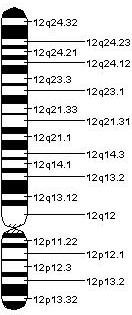Peripherin
Peripherin[edit]

Peripherin is a type of intermediate filament protein that is primarily expressed in the peripheral nervous system. It plays a crucial role in the development and maintenance of neurons, particularly in the axons of sensory neurons and motor neurons.
Structure[edit]
Peripherin is a member of the type III intermediate filament protein family. It shares structural similarities with other intermediate filament proteins, such as vimentin, desmin, and glial fibrillary acidic protein (GFAP). The protein is encoded by the PRPH gene, which is located on chromosome 12 in humans.
Function[edit]
Peripherin is involved in the formation of the cytoskeleton in neurons. It contributes to the stability and integrity of the axons, facilitating the proper transmission of nerve impulses. Peripherin is also implicated in the regeneration of nerve fibers following injury, making it a protein of interest in neurodegenerative disease research.
Expression[edit]
Peripherin is predominantly expressed in the peripheral nervous system, but it can also be found in certain regions of the central nervous system. Its expression is regulated during neuronal development and is upregulated in response to nerve injury.
Clinical Significance[edit]
Mutations or dysregulation of peripherin have been associated with various neurological disorders. For instance, abnormal peripherin aggregation has been observed in amyotrophic lateral sclerosis (ALS) and other motor neuron diseases. Research is ongoing to understand the role of peripherin in these conditions and its potential as a therapeutic target.
Related pages[edit]
Ad. Transform your life with W8MD's Budget GLP-1 injections from $75


W8MD offers a medical weight loss program to lose weight in Philadelphia. Our physician-supervised medical weight loss provides:
- Weight loss injections in NYC (generic and brand names):
- Zepbound / Mounjaro, Wegovy / Ozempic, Saxenda
- Most insurances accepted or discounted self-pay rates. We will obtain insurance prior authorizations if needed.
- Generic GLP1 weight loss injections from $75 for the starting dose.
- Also offer prescription weight loss medications including Phentermine, Qsymia, Diethylpropion, Contrave etc.
NYC weight loss doctor appointmentsNYC weight loss doctor appointments
Start your NYC weight loss journey today at our NYC medical weight loss and Philadelphia medical weight loss clinics.
- Call 718-946-5500 to lose weight in NYC or for medical weight loss in Philadelphia 215-676-2334.
- Tags:NYC medical weight loss, Philadelphia lose weight Zepbound NYC, Budget GLP1 weight loss injections, Wegovy Philadelphia, Wegovy NYC, Philadelphia medical weight loss, Brookly weight loss and Wegovy NYC
|
WikiMD's Wellness Encyclopedia |
| Let Food Be Thy Medicine Medicine Thy Food - Hippocrates |
Medical Disclaimer: WikiMD is not a substitute for professional medical advice. The information on WikiMD is provided as an information resource only, may be incorrect, outdated or misleading, and is not to be used or relied on for any diagnostic or treatment purposes. Please consult your health care provider before making any healthcare decisions or for guidance about a specific medical condition. WikiMD expressly disclaims responsibility, and shall have no liability, for any damages, loss, injury, or liability whatsoever suffered as a result of your reliance on the information contained in this site. By visiting this site you agree to the foregoing terms and conditions, which may from time to time be changed or supplemented by WikiMD. If you do not agree to the foregoing terms and conditions, you should not enter or use this site. See full disclaimer.
Credits:Most images are courtesy of Wikimedia commons, and templates, categories Wikipedia, licensed under CC BY SA or similar.
Translate this page: - East Asian
中文,
日本,
한국어,
South Asian
हिन्दी,
தமிழ்,
తెలుగు,
Urdu,
ಕನ್ನಡ,
Southeast Asian
Indonesian,
Vietnamese,
Thai,
မြန်မာဘာသာ,
বাংলা
European
español,
Deutsch,
français,
Greek,
português do Brasil,
polski,
română,
русский,
Nederlands,
norsk,
svenska,
suomi,
Italian
Middle Eastern & African
عربى,
Turkish,
Persian,
Hebrew,
Afrikaans,
isiZulu,
Kiswahili,
Other
Bulgarian,
Hungarian,
Czech,
Swedish,
മലയാളം,
मराठी,
ਪੰਜਾਬੀ,
ગુજરાતી,
Portuguese,
Ukrainian